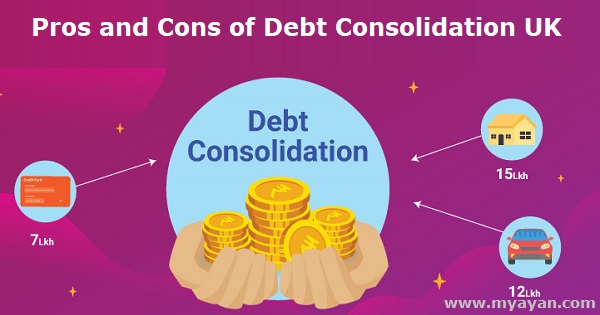Debt consolidation combines several unsecured debts—payday loans, credit cards, medical bills—into a single monthly bill that's paid off with a personal loan or balance transfer. It may be an excellent solution for people having trouble making ends meet. However, like any financial remedy, you should understand the pros and cons of Debt Consolidation UK, so you know what you're getting into. As a result, we've compiled this brief summary of the issue - which explains all there is to know about debt consolidation.
Consolidating your debts might save you time and money and reduce the amount of interest you pay. Some major pros of debt consolidation UK are as follows.
One of the key benefits of debt consolidation is that it simplifies your monthly repayments. When you consolidate your debts, you make a single payment each month rather than several payments to multiple creditors. This can save you money on bank fees and make it easier to keep track of your repayment schedule.
Debt consolidation can also lead to reduced interest rates on your outstanding balances. When you consolidate your debts, you may be able to secure a lower interest rate than what you're currently paying. This could help you save money on interest charges and pay off your debt faster.
Another potential benefit of debt consolidation is that it could help improve your credit score over time. When you consolidate your debts, you make one large monthly loan payment. This can help improve your payment history, one of the key factors that make up your credit score.
One of the main reasons people consolidate their debts is to lower their monthly payments. When you consolidate your debts, you combine all your outstanding balances into one loan with a single monthly payment. This can help make your debt more manageable and reduce the financial strain on your budget each month.
In some cases, you may be able to access additional cash when you consolidate your debts. This can be handy if you need extra money to make a large purchase or cover an unexpected expense. Having access to extra funds for emergency is among many pros of debt consolidation UK.
While it can offer some advantages, there are also some potential cons of debt consolidation UK.
You may pay more in interest over your loan. When you consolidate your debts, you take out one large loan to pay off several smaller loans. This means you'll have one larger loan with a higher interest rate. As a result, you may end up paying more in interest over the life of your loan.
One of the potential cons of debt consolidation UK is that you may miss out on rewards from your credit cards. If you have any rewards-based credit cards, you may lose out on these rewards when you consolidate your balances. This is because you're likely to close your credit card accounts when you consolidate your debts.
When you consolidate your debts, you take out one large loan to pay off several smaller loans. This means you'll have one larger loan with a higher interest rate. As a result, you may end up paying more in interest over the life of your loan. This could lead to missed payments and damage your credit score.
Sometimes, you may be required to pay an upfront fee to consolidate your debts. You may also be charged interest on the loan used to consolidate your debts. As a result, you need to weigh the potential costs and benefits of debt consolidation before deciding if it's right for you.
You'll typically need good credit and a steady income to qualify for a consolidation loan. If you don't have either of these things, you may not be able to qualify for a consolidation loan. As a result, you'll need to consider other options for consolidating your debts.
Conclusion on the pros and cons of debt Consolidation
If you're struggling under the weight of high-interest credit card debts, consolidating your debts into one monthly payment with a lower interest rate can be a huge relief. However, if you have bad credit or no collateral, you may not be able to find a lender willing to work with you. Before making any decisions about debt consolidation, it's important to get all the facts and understand the risks involved.

If your new loan or line of credit pays less than the interest rates on your existing debts, it's a bad idea to consolidate them. This occurs when the interest rate on your new loan or line of credit exceeds your existing obligations, defeating the consolidation's objective. There would be only one advantage in this scenario: having all your debts in one place.
One of the most significant drawbacks of debt consolidation is that it is not available to everyone. You will probably be denied a loan if your credit score is bad. Even if you are accepted for one, you may not be receiving the greatest interest rate if your credit score is below 700.
Debt consolidation loans can harm your credit, but it's only for a short time. When you consolidate debt, your credit is evaluated, which may lower your score. Consolidating numerous accounts into one loan can reduce your credit utilization ratio and impact your score.
A hard search will be recorded if you apply for a debt consolidation loan or any other credit. Your score may be temporarily lowered as a result of this. However, provided that you don't apply for credit frequently, your score should quickly return to normal. Closing old accounts can also hurt your score.